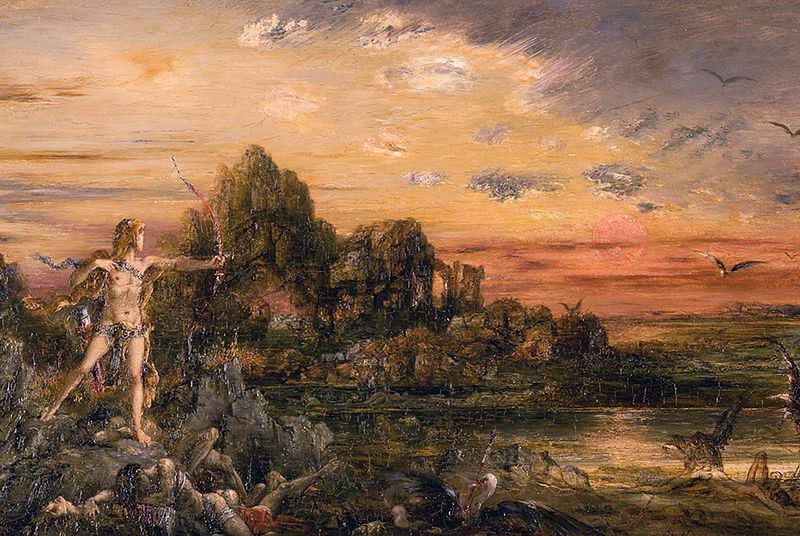STYMPHALIAN BIRDS IN GREEK MYTHOLOGY
The Stymphalian Birds were some of the deadliest creatures said to have inhabited ancient Greece, at least as far as Greek mythology goes. The Stymphalian Birds were famously encountered by Heracles, as he was giving the task of ridding Arcadia of these man-eating birds.
The Origin of the Stymphalian Birds
The origin of the Stymphalian Birds is not totally clear, for it was suggested that they were sacred birds raised by Ares, or were pets of Artemis. Pausanias suggested that the Stymphalian Birds were part of a larger population of the same sort of birds found in the Arabian Peninsula who made their home in Arcadia.
This home was said to be in the dense woodland and shrubland surrounding Lake Stymphalis, safe from any predators or hunters.
This home was said to be in the dense woodland and shrubland surrounding Lake Stymphalis, safe from any predators or hunters.
Characteristics of the Stymphalian Birds
The Stymphalian Birds were of course no ordinary birds, and Pausanias tells of them being the size of cranes. It was not their size that made them important in Greek mythology, but their lethal characteristics.
The Stymphalian Birds were described as man-eating, with beaks of bronze that could penetrate all armour of iron or bronze. Also, these birds had wings made of brass, and out of these wings feathers could be fired, just as if they were arrows.
These birds would thus go out into the lands surrounding Lake Stymphalis, devouring all the fruit, and all the crops they could find.
The Stymphalian Birds were described as man-eating, with beaks of bronze that could penetrate all armour of iron or bronze. Also, these birds had wings made of brass, and out of these wings feathers could be fired, just as if they were arrows.
These birds would thus go out into the lands surrounding Lake Stymphalis, devouring all the fruit, and all the crops they could find.
Heracles and the Stymphalian BirdsHeracles would be set is sixth labour by King Eurystheus, a commandment to rid Arcadia of these Stymphalian Birds. These was of course no simple task, for it was not a single monster which Heracles could vanquish, but hundreds, if not thousands of individual birds.
Heracles would be aided in his quest by the goddess Athena, who presented him with a bronze crotalum, a noise making instrument, as crafted by Hephaestus. Heracles would play the crotalum, and the resulting noise caused the Stymphalian Birds to leave the dense vegetation around the lake. No small number of the Stymphalian Birds were subsequently killed by arrows shot from Heracles bow, but even the vast numbers killed was but a fraction of the total number of birds. By continuing to play the crotalum, the Stymphalian Birds were driven off from their roosts and nests, and the continuation of the noise meant that they would not return. As a flock, the Stymphalian Birds flew from Arcadia to seek out a new home, and this proved to be the Island of Aretias, but in driving them out of Arcadia, Heracles had completed his Labour. |
|
The Stymphalian Birds and the Argonauts
The encounter of Heracles and the Stymphalian Birds, proved not to be the only appearance of the monstrous birds in Greek mythology, for shortly afterwards, these birds would also be encountered by the Argonauts.
Phineus had warned the Argonauts of the dangers posed by the birds of Aretias, and so as the Argo approached the shore of the island, half of the Argonauts took up their shields and spears, whilst the others rowed. Before landing the Argonauts let out a loud roar and started to bang their spears upon their shields.
Thousands of Stymphalian Birds then rose skywards, and whilst feathers from the birds were launched at the Argonauts, the heroes’ shield kept them safe, and by keeping the banging on their shields going, the birds were driven away from the island towards the mainland.
Phineus had warned the Argonauts of the dangers posed by the birds of Aretias, and so as the Argo approached the shore of the island, half of the Argonauts took up their shields and spears, whilst the others rowed. Before landing the Argonauts let out a loud roar and started to bang their spears upon their shields.
Thousands of Stymphalian Birds then rose skywards, and whilst feathers from the birds were launched at the Argonauts, the heroes’ shield kept them safe, and by keeping the banging on their shields going, the birds were driven away from the island towards the mainland.
|
|
Colin Quartermain - Stymphalian Birds - 19th November 2019
